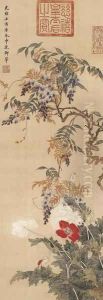Empress Ci Xi Paintings
Empress Dowager Cixi, also known as Ci Xi, Tzu Hsi, or Empress Dowager T'zu-hsi, was one of the most powerful women in the history of China, effectively controlling the Chinese government for 47 years, from 1861 until her death in 1908. While not an artist herself in the traditional sense, her influence extended to various aspects of Chinese culture, including the arts. Born on November 29, 1835, as Yehenara Xingzhen to an ordinary Manchu family of the Yehenara clan, she entered the imperial harem as a low-ranking consort to the Xianfeng Emperor in 1851.
Cixi rose to prominence after bearing the emperor's only son, Zaichun, in 1856. Upon the Xianfeng Emperor's death in 1861, her five-year-old son ascended to the throne as the Tongzhi Emperor, and Cixi, as his mother, became the Empress Dowager. Alongside Empress Dowager Ci'an, she orchestrated a coup that ousted the regents appointed by the late emperor, assuming control as co-regent.
During her time in power, Cixi faced numerous challenges, including the Taiping Rebellion, the Boxer Rebellion, and various foreign invasions. Despite being conservative in her political approach and resistant to any forms of constitutional monarchy, Cixi initiated the Self-Strengthening Movement, which aimed to adopt Western military technology and education systems while retaining Confucian principles and institutions.
Her patronage of the arts led to the flourishing of traditional Chinese art forms, such as Peking opera, and she is known for extensively renovating and expanding the Summer Palace in Beijing. Cixi had a particular fondness for jade and amassed a large collection of jade art pieces during her lifetime.
Empress Dowager Cixi's legacy is complex; she has been both vilified as a despot and commended for her leadership during a period of great upheaval. She passed away on November 15, 1908, just one day after the death of the Guangxu Emperor, whom she had placed under house arrest years earlier. Her death marked the end of her direct influence on the Qing Dynasty, which would fall just a few years later in 1912, ending over two thousand years of imperial rule in China.
